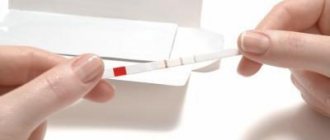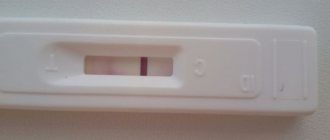Factors leading to menstrual variability
A healthy menstrual cycle is 21-37 days. Periods that are shorter or longer than these values are considered irregular. Unstable bleeding is also considered to be those that constantly change their duration.
The causes of irregular bleeding can be physiological or pathological. Physiological factors, as a rule, are eliminated on their own, but pathological ones require therapeutic measures.
Causes of irregular cycles include:
- Teenage years . Until the age of 17, girls develop hormonal balance, so their periods are unstable. If your periods remain irregular for a year or more after menarche, consult your gynecologist.
- Improper functioning of the thyroid gland , which synthesizes hormones involved in the functioning of the endocrine system. With diseases of this organ, amenorrhea may develop - the absence of menstruation for 6 months or more.
- Lactation . When a woman breastfeeds, her body increases the synthesis of prolactin, a hormone that suppresses the production of hormones by the ovaries. This leads to the absence or variability of menstruation. Cyclicity is restored after the woman stops breastfeeding.
- Unhealthy weight. Severe thinness or obesity leads to a lack of bleeding, as the body reacts to a sudden change in body weight. Overweight people experience hormonal imbalances because fat tissue also produces hormones.
- Excessive physical activity. Regular strenuous exercise depletes the body's energy reserves, making it unable to maintain menstrual function. The only way to improve your menstrual cycle if your periods are irregular is to significantly reduce the frequency and intensity of strength training.
- Emotional instability. Constant stress, insufficient sleep, chronic fatigue lead to exhaustion of the body. These phenomena provoke hormonal imbalance, which causes cyclical disturbances.
- Unhealthy Lifestyle. An unhealthy diet, a sedentary lifestyle, along with drinking alcohol and smoking disrupt the menstrual cycle.
- Taking medications. Some drugs change hormonal levels and distort menstrual function.
- Diseases of the pelvic organs. Inflammatory phenomena, infectious processes, hormonal imbalances lead to changes in the appendages and in the reproductive organ.
Even common colds can affect the cyclicity of menstruation. But such violations are rare, in which case menstruation is restored on its own.
What is an irregular menstrual cycle?
First of all, this is a signal from the body for a woman that it is necessary to see a doctor, since there has been a failure in the functioning of the reproductive system. From a medical point of view, an irregular cycle is the first symptom of possible infertility in the future.
It is customary to judge how regular a cycle is by the number of days in the cycle. The duration of the cycle without pathologies ranges from 21 to 35 days. If values are observed that go beyond the specified range, this is an irregular menstrual cycle.
In addition, it is necessary to visit a doctor if the cycle numbers are within the acceptable range, but vary too much, for example, one month is 23 days, and the second is 31.
In medicine, there are reasons that can affect the natural course of the cycle:
- Any illness, even a runny nose.
- Stressful situation.
- Abrupt climate change.
- Lactation.
- Pregnancy.
Often the cause of failure in cycles is excessive loads. This is a common occurrence for athletes.
However, if a woman is not an athlete, but training is the cause of the failure, it is important to immediately consult a doctor. Another reason for irregularities in the menstrual cycle is a sudden change in weight in any direction. However, to normalize the cycle, the doctor may advise either reducing weight, or vice versa - adding a little.
Symptoms indicating cycle irregularity
- Heavy bleeding.
- Scanty bleeding.
- Severe pain.
- Sudden change of mood.
Any of the symptoms described is a reason not to put off a visit to the doctor for too long.
https://youtu.be/I9C1FPaNQo8
Possibility of getting pregnant with irregular periods
Irregular menstruation directly affects the ability to conceive a child. At the same time, women cannot determine the favorable period using standard calculations.
The best option in this case is to plan the pregnancy for a long time, which in most situations gives a positive outcome.
The menstrual cycle and pregnancy are interconnected. Women with infrequent bleeding find it more difficult to conceive; they are wondering whether it is possible to get pregnant with irregular periods. Doctors give a positive answer: if fertilization fails, it can happen quickly or you will have to wait.
Pregnancy with an irregular cycle depends on the cause of menstrual imbalance.
If menstruation is absent for a long time as a result of exposure to physiological factors (fasting, stress, overexertion), then pregnancy will occur after these causes are eliminated and the body’s functioning is normalized.
If the cycle “jumps” due to pathological phenomena, then conception may not occur. To increase your chances of successfully getting pregnant with an irregular cycle, you need to be monitored by a gynecologist. Typically, the patient needs to take hormonal medications for a long period of time.
How to get pregnant using traditional methods
Of course, our ancestors also faced the problem of irregular cycles, so they had many effective remedies in their arsenal. For the most part, they are decoctions based on various herbs, plant seeds, juices, etc. Let's look at some recipes in more detail.
Important! More traditional methods if you can’t get pregnant can be found in our article.
Decoction based on shepherd's purse
Pour two tablespoons of herb into a liter of boiling water and let it brew in a dark place. Take 100 grams of decoction 3 times a day. This recipe is good for heavy menstrual bleeding.
Lime tea
Linden is excellent for the treatment of menstrual irregularities, normalizes it, and reduces pain. To prepare, chop 20 g of linden flowers, pour a liter of boiling water over them and leave for 30 minutes. Tea should be drunk warm 2 times a day, at least 100 g at a time.
Decoction of fireweed leaves
Pour 20 g of dry fireweed leaves into a liter of hot water and leave for an hour. Take the decoction one tablespoon once a day.
Sweet rue leaves
A decoction of fragrant rue leaves is widely used in alternative medicine to treat irregular menstruation. To prepare it, place a teaspoon of dry leaves in 100 g of boiling water and simmer for about 15-20 minutes, without bringing to a boil. After time, remove from heat and strain. The next day, in the morning, drink the resulting decoction on an empty stomach, and do not eat anything for 6 hours.
Carefully! The fragrant rue plant is poisonous to humans in large quantities! Do not exceed the dosage!
Oregano-based decoction
Oregano is a good remedy for delayed menstruation; to prepare the remedy, add 20 g of dry herb to 500 g of boiling water, let it brew in a warm place. Drink 200 g three times a day.
Infusion based on cuff
The recipe helps with irregular and heavy periods. To prepare 5 g of dried mantle, pour 200 g of boiling water and leave overnight in a dark place. Drink 50 g 4 times before meals.
Parsley seeds
If you have had a long, unexplained delay in menstruation, it is recommended to eat half a teaspoon of dry parsley seeds 3-4 times a day and drink plenty of water.
St. John's wort juice
Extract the juice from fresh St. John's wort leaves and take a tablespoon once a day. This remedy helps very well to normalize the cycle and cope with stress and overexertion.
Decoction based on anise seeds
If your period does not come for a long time, a decoction of anise seeds will help. To prepare the decoction, pour 35 g of seeds into a bowl, add 200 g of hot water, and put on fire. As soon as the mixture boils, simmer it over low heat for 10 minutes, then cool and strain through cheesecloth.
Tincture based on boron uterus
It is a good remedy for normalizing the functioning of the endocrine system. To prepare, pour 2 teaspoons of dried herbs into a liter of vodka and leave to infuse in a dark place for 2 weeks. Take the prepared mixture one teaspoon 3 times a day before meals. It is recommended to dilute the tincture in 100 g of filtered water.
Decoction for short menstrual cycles
The herbs tar and shepherd's purse will help to lengthen the menstrual cycle. To prepare, you need to take a tablespoon of each herb and pour 1.5 cups of hot water. The cooled broth must be strained through gauze. Take the entire volume of tincture throughout the day in 4-5 servings 7-4 days before the start of menstruation.
How to understand that ovulation is occurring
The possibility of getting pregnant against the background of a broken cycle is 20%, provided that you conceive on fertile days. In women with a healthy cycle, ovulation occurs 14 days after menstruation.
Correctly determining fertile days against the background of menstrual irregularities is difficult. You will not be able to use the traditional calendar calculation method.
The most accurate way to determine ovulation in an irregular cycle is an ultrasound scan. You will have to perform folliculometry several times in 30 days. If the parameters of the dominant follicle reach 18 mm, then the most favorable period for conception begins.
It is recommended to have sexual intercourse on this day and in the next few days.
Special tests that are sold in pharmacies will also help to catch ovulation. They need to be placed in a container with urine, just like pregnancy tests. This test helps to accurately determine ovulation.
The simplest method of identifying fertile days is to use a regular thermometer to determine basal temperature. A woman should measure the temperature in the vagina or anus every morning and record the data obtained.
In the first days of menstruation, the temperature drops slightly. By the day of ovulation, the readings exceed 36.6 degrees.
Values within 37 degrees indicate the descent of the egg into the uterus and its readiness for fertilization. The onset of ovulation is indicated by a sharp jump in values.
When should you take a pregnancy test?
If you constantly monitor ovulation and know the possible day of conception, then it will be easy to identify a delay.
If your periods are unstable, pregnancy is indicated by the absence of bleeding 14 days after ovulation. That is, you need to do the test no earlier than 14 days after sexual intercourse.
If ovulation has not been assessed, take a pregnancy test a few days before your expected period. If the result is negative and there is no period, repeat the test in a week. You can also take a blood test for hCG or do an ultrasound to determine successful fertilization.
Successful fertilization is also indicated by basal temperature values. If you tracked your fertile period using a thermometer, you can continue measuring further.
If the temperature readings correspond to 37 degrees for 14 days, then this may indicate pregnancy. You can even catch the moment of implantation of the fertilized egg into the mucous epithelium of the uterus: within one day the temperature will decrease.
Algorithm for planning pregnancy during an abnormal cycle
If you want to conceive a child due to inconsistent menstruation, then you are recommended:
- Get examined. Visit a gynecologist, perform an ultrasound scan, get tested for sex hormones and thyroid hormones. Perhaps the dysfunction can be eliminated by simply taking medications.
- Check your fertile days regularly.
- Have sex 2-3 times a week. Regular sexual intercourse increases the likelihood of getting pregnant and helps normalize the monthly cycle.
- Normalize your body weight.
- Give up bad habits for a while.
- Avoid emotional stress.
You should also increase the body’s immune status and eat right.











